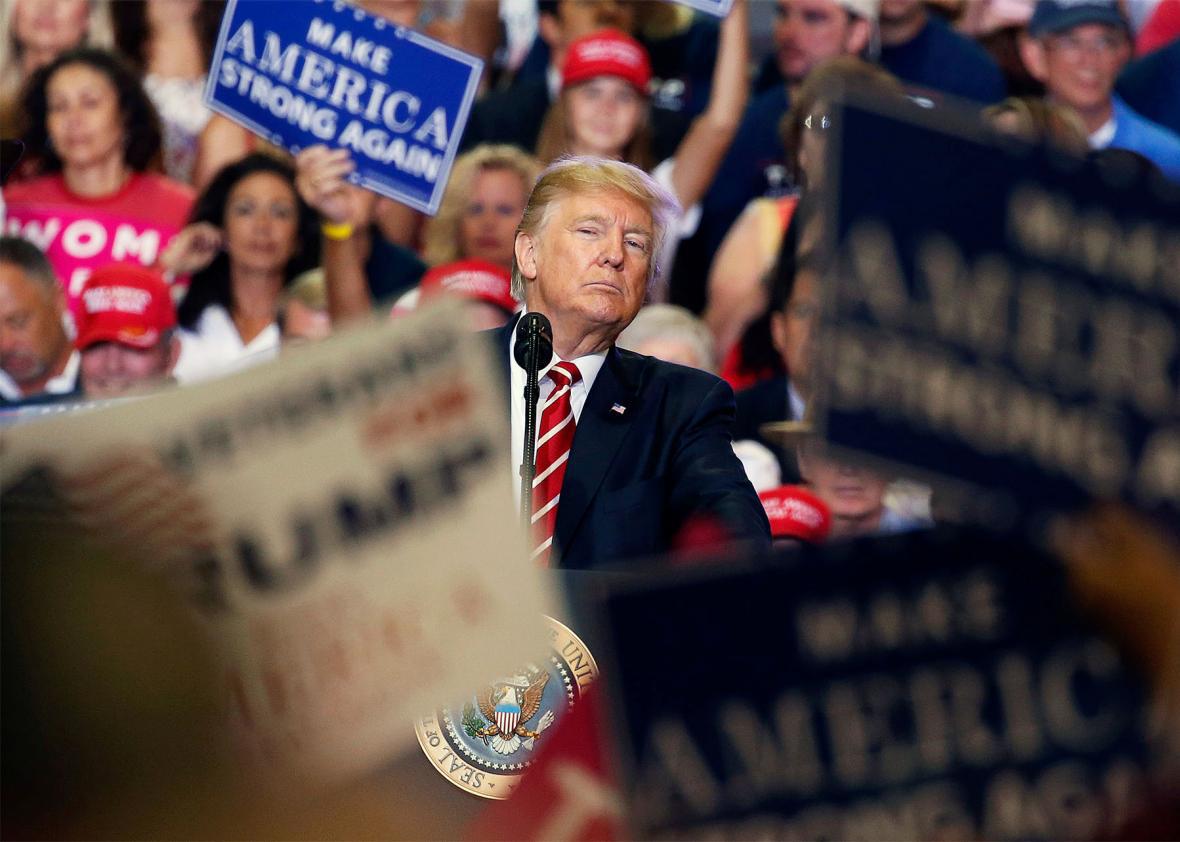One thing you discover as a parent is that what you do is more important than what you say. If you curse at drivers, your kids don’t learn that drivers are stupid; they learn to curse. If you hit your kids, they don’t learn that it’s wrong to do what you hit them for; they learn that it’s OK to hit.
The same is true of being president. At a rally last night in Phoenix, President Trump talked about unity, selflessness, racial healing, and the rule of law. Then he made clear that he doesn’t believe in any of these things.
“Our movement is a movement built on love. It’s love for fellow citizens,” said Trump. He went on: “We are all on the same team. We are all Americans.” Then Trump spent most of the speech attacking his teammates. Twelve times, he called the media “dishonest,” “crooked,” or “sick.” “They’re bad people,” he concluded. “And I really think they don’t like our country.” He derided “all of the Democrats in Congress” (“They obstruct, that’s all they do”), Arizona Republican Sen. Jeff Flake (“Nobody knows who the hell he is”), TV pundits (“lightweights … that nobody ever heard of”), CNN (“pathetic”), and executives who have withdrawn from White House business councils to protest Trump’s remarks about Charlottesville, Virginia (“I remember the ones that did”). In a gesture that echoed his mockery of a disabled reporter, the president lowered a hand to ridicule the shortness of “little George Stephanopoulos.”
Trump talked about serving others. “Washington is full of people who are only looking out for themselves,” he declared. “But I don’t come to Washington for me.” Then he boasted of how many bills he had signed, claiming—without even mentioning what the bills were about—that no president had done as much as he has. He bragged about his post-Charlottesville statements (“The words were perfect”), his speech Monday night on Afghanistan (it “got great reviews”), his coinage of “extreme vetting” (“I came up with that term”), and businessmen who, according to Trump, have been asking him for lunch dates. Trump said of his critics: “I went to better schools than they did. I was a better student than they were. I live in a bigger, more beautiful apartment. And I live in the White House, too.”
Trump talked about law and order. “We believe in the rule of law,” he said. But two minutes later, he signaled that he would pardon former Sheriff Joe Arpaio, the Arizona lawman who was found guilty last month of defying court orders in a personal crusade against undocumented immigrants. Trump dismissed Arpaio’s law-breaking, saying he was “convicted for doing his job.”
Trump talked about racial reconciliation, presenting himself as a champion of Americans from “inner cities” and “from every background.” But he denounced the removal of Confederate statues, saying: “They are trying to take away our history and our heritage. … They’re trying to take away our culture.” A century-and-a-half after the Civil War, Trump specifically protested the disappearance of statues that “have been there for 150 years.”
But Trump’s most revealing comments, by far, were about his post-Charlottesville statements. He reread the statements aloud, claiming that they proved his sincerity in condemning racism. Even as he read them, he inserted play-by-play commentary that made clear it was all for show:
[reading] “Egregious display, hatred, bigotry, and violence.” OK? I think you can’t do much better, right? …
Then I go: “We must love each other. Show affection for each other.” …
[reading] “And those who cause violence in its name are criminals and thugs, including the KKK, neo-Nazis, white supremacists, and other hate groups that are repugnant to everything we hold true as Americans.” Now, let me ask you: Can it be any better than that? …
I said everything. I hit ‘em with “neo-Nazis.” I hit ‘em with everything. I got the “white supremacists,” the “neo-Nazi”—I got ‘em all in there. Let’s see: Yeah. “KKK.” We have “KKK.” I got ‘em all.
To Trump, it’s all a script. He had a checklist of magic words to deliver after Charlottesville, and he delivered them. The whole thing was about nailing his lines. (For the Arizona crowd Tuesday night, Trump edited the script, deleting the phrase “on many sides,” which he had ad-libbed twice in his initial remarks about Charlottesville to deflect blame from the white supremacists.) The idea that the president’s remarks in such a crisis were supposed to be for and about other people, not for or about him, seems beyond his comprehension.
During the campaign, cable networks used to air Trump’s rallies in their entirety. After he got elected, they took a lot of blame for that. The argument was that they had helped him spread his message (and, in fact, MSNBC did not air his full speech last night). But since his election, in focus groups, Trump’s behavior has worn poorly. Persuadable voters—or, more precisely, the dissuadable voters who initially put Trump in office—are often repelled by his displays of spite, ego, and volatility. We don’t need Don Lemon to expose what Trump really is. We just need Trump to keep talking.
